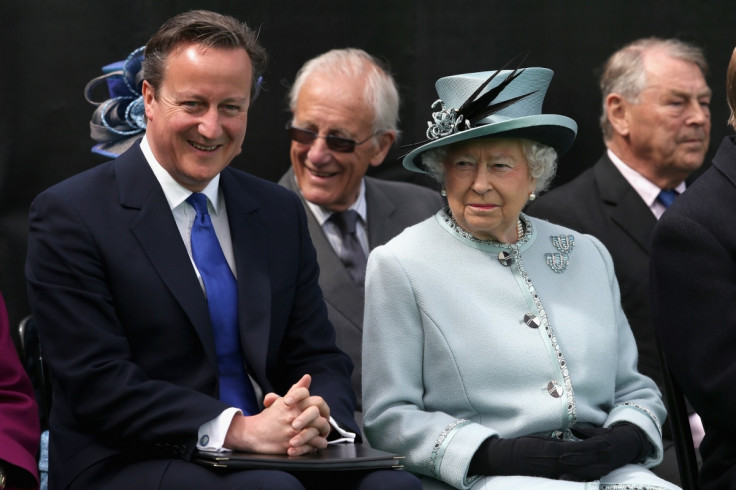David Cameron tells the Queen Buhari's Nigeria is 'fantastically corrupt' in off mic blunder
David Cameron has been caught off-guard, seemingly calling Nigeria and Afghanistan "two of the most corrupt countries in the world" ahead of an anti-corruption summit in London on Thursday12 May. The prime minister was reportedly overheard making the remarks to Queen Elizabeth II as the pair discussed the upcoming event, the first global summit dedicated to tackling corruption, at Buckingham Palace.
"We had a very successful cabinet meeting this morning. We talked about our anti-corruption summit. We've got leaders of some fantastically corrupt countries coming to Britain. Nigeria and Afghanistan are possibly two of the most corrupt countries in the world," Cameron said, according to footage from ITV News that picked up what was thought to be an off-mic conversation.
The Archbishop of Canterbury Justin Welby and House of Commons Speaker John Bercow were also in attendance at the reception to mark The Queen's 90th birthday.
The comments came ahead of the landmark summit, which will see Cameron host world and business leaders in a bid to tackle corruption. According to reports, The Queen - who is the head of the Commonwealth that includes Nigeria - did not respond to Cameron's comment, turning her head away. However, Welby, who has worked in Nigeria, then said of that country's leader: "But this particular president is actually not corrupt."
Nigerian president Muhammadu Buhari is expected to speak twice at the event, first as a keynote speaker at a pre-conference meeting organised by Baroness Patricia Scotland, the new secretary-general of the Commonwealth, and later at the main summit.
"President Buhari intends to share experiences with other leaders. He is of the strong conviction that increasing globalisation has made it difficult, if not impossible for stand-alone nations to combat corruption; that without global synergies against corruption, nations will fail in their efforts towards economic growth, maintaining security, reducing poverty and protecting the environment for their children," a spokesman for the Nigerian leader said ahead of the visit.
"He will, in the light of this seek support for anti-corruption capacity for our national institutions and the citizenship. As his own contribution, the president has substantially aligned himself with major initiatives enunciated by the convener, Prime Minister David Cameron, that seek to increase transparency and governance in several key areas."

Buhari also plans to focus on trade and investment between Nigeria and the UK as part of his trip. "It is hoped that the bilateral discussions between the prime minister and our president will focus on issues of common interest and do everything possible to take the relationship between the two countries to newer heights," the spokesperson added.
A Number 10 spokesperson said Buhari and President Ghani of Afghanistan have acknowledged the scale of the corruption challenge they face in their countries.
"In a collection of essays on the fight against corruption to be published on the day of the Summit, President Ghani writes that Afghanistan is ''one of the most corrupt countries on earth' while President Buhari writes that that corruption became a 'way of life' in his country under 'supposedly accountable democratic governments'," the Downing Street spokesperson added.
"Both leaders have been invited to the Summit because they are driving the fight against corruption in their countries. The UK stands shoulder to shoulder with them as they do so. We cannot comment on a conversation between the prime minister and the Queen."
This is not the first David Cameron off mic blunder. In 2014, Cameron broke convention to tell the former New York mayor, Michael Bloomberg, that The Queen "purred down the line" when he informed her that Scotland had voted against independence. He later admitted that he felt "extremely sorry and very embarrassed" and apologised to The Queen.
© Copyright IBTimes 2025. All rights reserved.






















